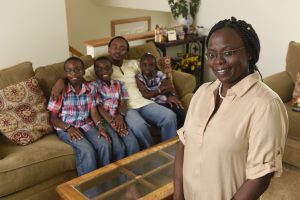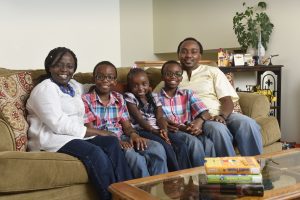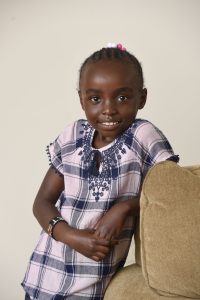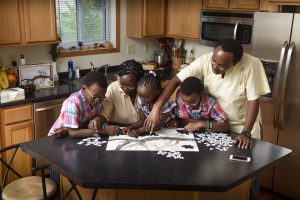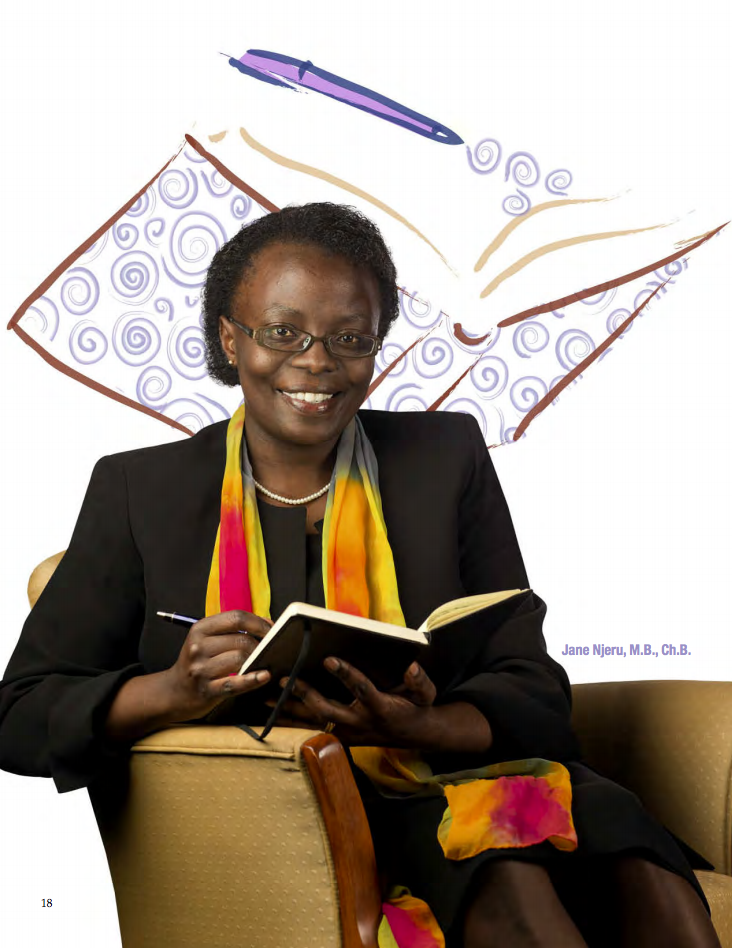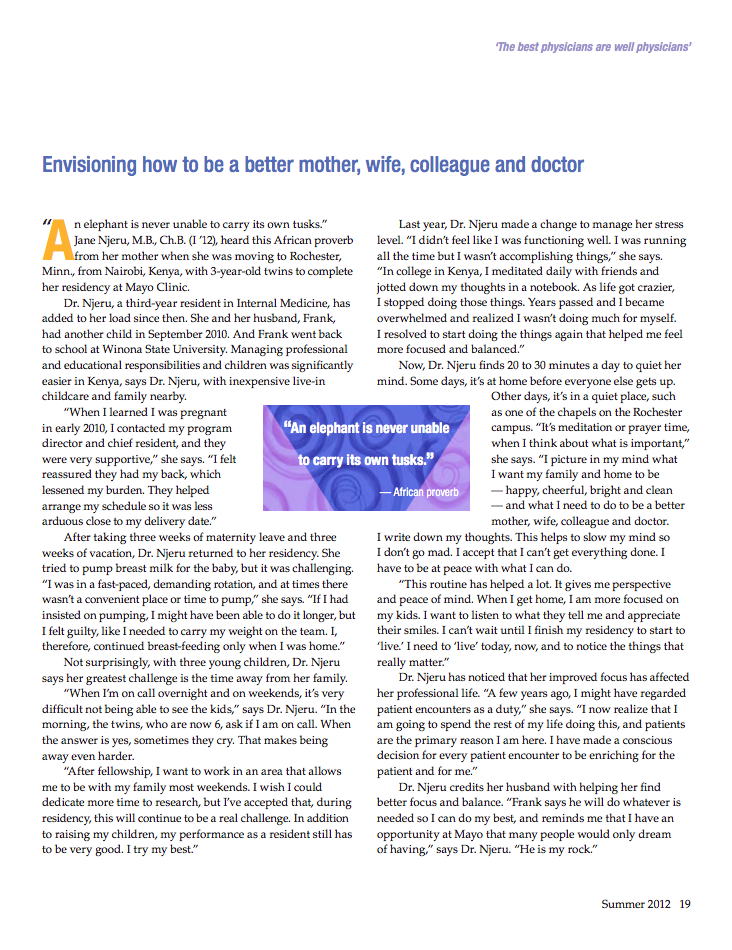Jane Njeru, M.B., Ch.B. — Finding the tools to be a balanced physician, colleague, mother and wife
Jane Njeru, M.B., Ch.B. (I ’12, PCIR ’13), was a resident with 6-year-old twin sons, John and Paul, and a 2-year-old daughter, Janet, when Mayo Clinic Alumni covered physician burnout and well-being in 2012. She and her husband, Frank Nthumbi, had moved to Rochester from Nairobi, Kenya, in 2009. Between being on call overnight and on weekends, Dr. Njeru struggled to spend time with her children. She didn’t feel as if she had enough time to dedicate to research. To cope with stress, she’d recently begun journaling and made a habit of spending time in one of the chapels on the Rochester campus to quiet her mind before going home to her family.
Finishing training, joining the staff
Dr. Njeru completed her residency in 2012 and a postdoctoral certificate in Clinical and Translational Science in 2013, and began a fellowship in primary care internal medicine research in 2013. She joined the staff in the Division of Primary Care Internal Medicine in 2013 and is an assistant professor of medicine.
Almost five years later, Dr. Njeru says residency was one of the most stressful time in her medical career to date. “We were still settling down in the U.S., away from our extended family and had a small baby during my clinical rotations. It was a confluence of things happening all together.
“The stressors are different now, but I’ve also grown in being able to handle them. Part of growth is knowing when to ask for help and who to turn to, and giving myself permission not to feel too stressed because I am not caught up with everything. The amount of work isn’t going to change, and the pressures will increase. I try to prioritize and take care of myself so I don’t burn out.”
“Part of growth is knowing when to ask for help and who to turn to, and giving myself permission not to feel too stressed because I am not caught up with everything.”
Getting support from division chair and colleagues
Dr. Njeru says her awareness of burnout is high because it’s frequently discussed in the workplace, at recent national medical society meetings and during annual reviews with her division chair, Sidna Tulledge-Scheitel, M.D. (I ’91, PREV ’93).
“Dr. Tulledge-Scheitel is a great cheerleader for all of us in the division,” she says. “She wants to support each of us in doing what we enjoy and help us succeed. Her support, together with that of my primary mentor, Dr. Mark Wieland (I ’08, CMR ’09), has been crucial for me during these last four years.
“One of the things I really appreciate about our division is the flexibility and support from colleagues. In our care team, twice a year we sit down together and figure out the next six-month block, including vacations. The older physicians in the group who don’t have school-age kids often offer those of us with young kids the chance to take the week of spring break off. That approach is so supportive and makes me feel less guilty about being away. I realize that one year it will be my turn to give up that time. My colleagues’ flexibility helps me not beat myself up too much.”
Making kids a priority
Dr. Njeru’s sons, John and Paul, who sometimes used to cry when she told them she was on call, have gotten used to their mother’s schedule. But they still get disappointed when she can’t make it to one of their swim meets. “When I tell them I can be there, I see the joy and delight in their faces,” she says. “It means something and is important to them.”
Her daughter, Janet, now 6, reminded her for weeks about her school Spring Sing show she was in. “They realize what I do is important, and they’re proud of me, but they need and want my emotional support,” says Dr. Njeru. “When I can’t be at their activities, my husband takes videos for me. On weekends I make being with my family a priority. I enjoy cooking — it’s a stress reliever for me. I often cook the week’s meals, and the kids help. We do household chores and homework together.”
Making self a priority
Another stress reliever is running. Dr. Njeru runs on a treadmill at home. She recently took up knitting again — a hobby she engaged in when she was growing up but had left behind. Every couple of months she gets together with a group of knitting friends.
In addition to hobbies, she takes other steps to manage stress and prevent burnout. She’s part of a COMPASS (Colleagues Meeting to Promote and Sustain Satisfaction) group. These physician engagement small groups meet every other week for a meal and discussion of subjects related to being physicians. “It’s amazing to hear what my colleagues are going through, how they deal with things and which hobbies they pursue,” she says. “It makes me feel encouraged about pursuing the things I enjoy.
“I’ve gotten to know my colleagues better through our COMPASS group. Thinking about the richness of each of them helps me be attentive and get more out of our encounters. I use the same approach in thinking about and interacting with my patients. Each one is a unique individual with their own unique experiences, dreams and concerns.”
Dr. Njeru recently registered for Mayo Clinic’s Healthy Living Program for Physicians. “A colleague in another division was excited to tell me she’d registered, and a light bulb went off for me,” she says. “I really look forward to participating in the program.”
She still journals and sits in the chapel during lunch or in the morning when she has time. And she says she got the golden opportunity to finally have time for research. In 2014, together with three other colleagues from Primary Care Internal Medicine, she was selected as a Population Health Scholar within the Population Health Science Program in the Mayo Clinic Center for the Science of Health Care Delivery. The program, whose overall mission is to improve primary care practice and advance population health science through health care delivery research, gave each scholar 40 percent protected research time for three years.
Recognizing her ‘rock’
One thing that hasn’t changed for Dr. Njeru in the last five years is her primary source of support — her husband, Frank. “He’s an electronics engineer who got an MBA in finance after we moved to the U.S., but he put his career on hold so we have stability at home for the children while they’re young,” she says. “He allows me to do what I enjoy. He never complains or says it’s too much — he doesn’t want me to feel guilty. He does whatever it takes to support me, and he does it all very silently. He keeps the children’s priorities right, and he fixes mine when they are off. As the children grow, I hope he can pursue something he enjoys. He is my rock.”
“He does whatever it takes to support me, and he does it all very silently. He keeps the children’s priorities right, and he fixes mine when they are off.”
